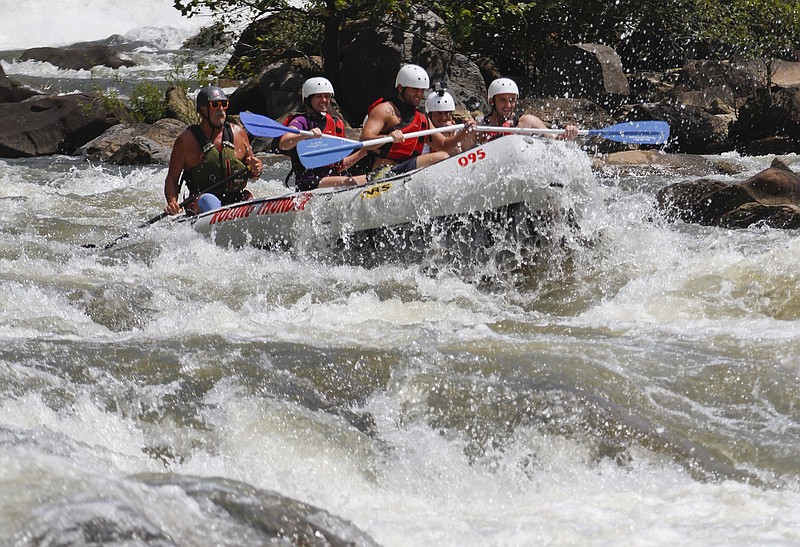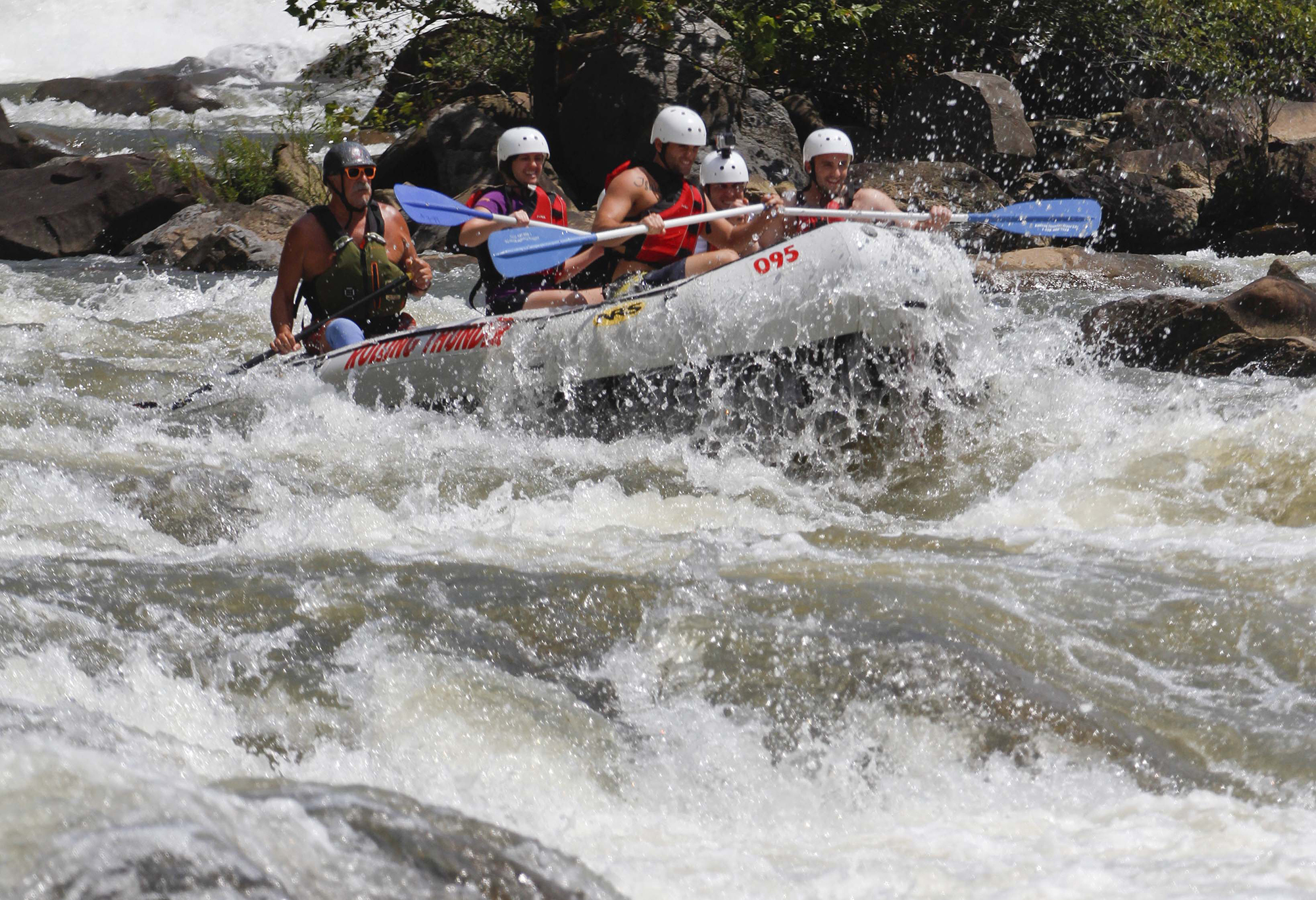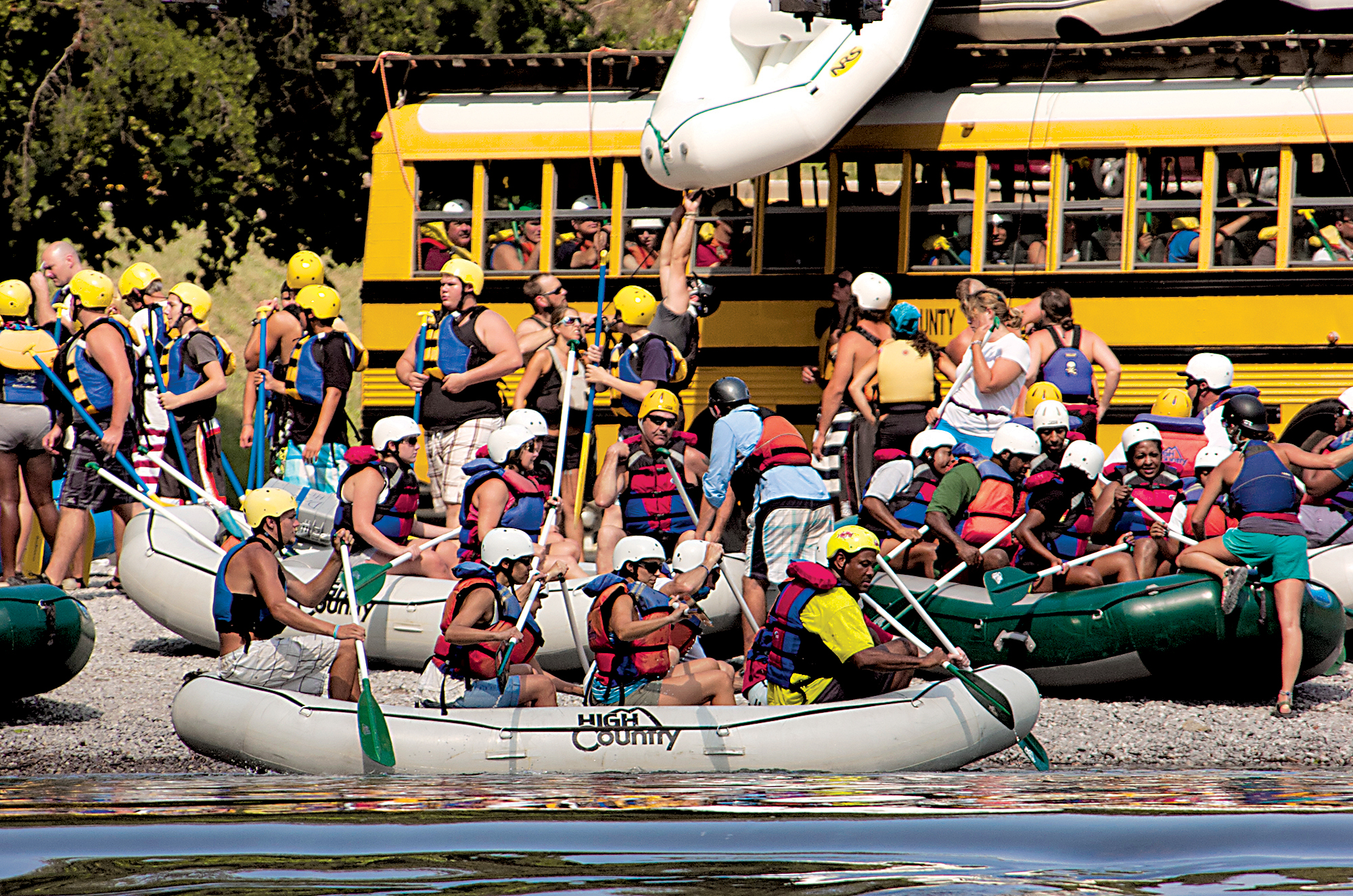Advocates for Polk County's Ocoee River, recently named the nation's most popular whitewater river by the America Outdoors Association, and a huge tourism draw for the region, say the area may cease to be a destination for rafting enthusiasts in just a few years.
Deals struck with the Tennessee Valley Authority in 1983 and 2006 that guarantee the steady flow of whitewater on the Middle and Upper Ocoee will expire at the end of 2018. Advocates say the projected numbers provided by TVA for a new contract beginning in 2019 are astronomically higher, and would likely put the industry built around the river in jeopardy.
"People are very worried. I think a lot of outfitters would definitely close up shop," said Stacy Stone, grassroots coordinator for the Ocoee River Council, an organization created to secure recreational water releases from TVA.
Also read this opinion column
Greeson: Cry me a river - TVA's right to increase fee
Currently, $1 from each Middle Ocoee rafting ticket and $4.50 of Upper Ocoee rafting fees go to TVA. Starting in 2019, according to TVA numbers given to council members in 2013, those payments would jump to $8.80 for the Middle Ocoee and $10.69 for the Upper Ocoee -- increases of 780 percent and 137 percent, respectively.
Fast facts about the Ocoee River
* Where: Polk County, Tenn. * Rapids: Class III and IV (skill level: experienced; advanced) * Annual visitors: More than 200,000 * Number of outfitters: 22 with active permits * 2015 rafting season: Sat., March 21-Sun. Nov. 1 For more information on the Ocoee River and the Ocoee River Council's mission, go to http://savetheocoee.org
By the numbers
Economic impact of Ocoee River whitewater rafting on the region (within a 60-mile radius of the Ocoee):* 622 full-time, full-year jobs* $43.83 million in total economic activity* $14.12 million in worker paychecks* $3.57 million in total federal, state and local taxes generated* 36 percent of jobs in Polk County in hospitality and tourism industrySource: "The Economic Impacts of Visitor Spending and Whitewater Rafting on the Ocoee River," 2012; Dr. Steve Morse, economist and associate professor, University of Tennessee at Knoxville
Robin Peak, the senior program manager for TVA who presented the numbers, said the increased rates are only projections.
"Those numbers are part of an ongoing negotiation," Peak said. "We've not given them a firm price yet."
Peak said the numbers reflect inflation and an increase in energy costs since the previous contracts. She also said they account for a high element of risk, given that TVA had to make the projections years ahead of the old contracts' expiration dates.
"It's like buying a car three years from now, you don't want to undersell," Peak said. She said TVA could provide firm numbers in the latter half of 2016.
The rates proposed in the new projections would pay TVA $1.8 million annually for five years. Peak said the numbers weren't written in stone, though David Brown, executive director of the Ocoee River Council from 1980-83 and its current coordinator, doesn't think that's true.
"We don't have any negotiating power with TVA," Brown said. "We're a small group of ruffian outfitters going up against a huge corporation armed with big-time lawyers."
TVA spokesman Chris Stanley insisted that the money TVA collects from the river outfitters isn't about profit.
"It's revenue-neutral for us," Stanley said. "These calculations are based on what it takes for us to go out there and replace the power that's lost."
The Ocoee's whitewater is created when TVA releases water over two dams instead of diverting it through a 4.5-mile-long wooden flume to a hydroelectric power station.
Peak said replacing the value of that lost power is key to maintaining low electricity rates for the 9 million customers the utility serves across the Southeast.
"We're not looking to put anyone out of business," Peak said. "We just want to make sure the ratepayer is made whole, and that includes people in Memphis as well as Polk County. We want to come to an agreement that everyone can work with."
Still, the projections have left people like Kip Gilliam concerned. Gilliam owns Cascade Outdoors, a rafting company on the Ocoee. He's also the president of the Ocoee River Outfitters Association. His company is smaller, taking about 4,000 people down the river each year. He said his business couldn't bear the strain of the proposed increase.
"None of us got into this business so we could retire early; we do this because we love the river," Gilliam said. "But I have a family of five I have to provide for."
JT Lemons is uneasy too. Lemons has been on the Ocoee whitewater scene since the beginning. He started his rafting company, Ocoee Outdoors, in 1977, and now it's one of 22 rafting companies with active permits on the river. Lemons said that besides outfitters, several family-owned restaurants, cabins and campgrounds in the area would suffer from the likely reduction in visitors.
"If we end up paying that, it will definitely have a negative impact for everyone on the river, and the entire southeast Tennessee area," Lemons said.
Polk County Executive Hoyt Firestone said he was concerned by the projections he's seen, especially given the low tax base in Polk County. According to Firestone, the U.S. Forest Service owns 51 percent of the land in the county. Add in land owned by other tax-exempt agencies like TVA, and the lack of large-scale manufacturing, and it becomes clear how much the area relies on tourism.
"Tourism is the leading industry right now, and the best prospect for future development," Firestone said. "The best piece of that is the Ocoee. I'd hate to see anything detrimental happen to it."
Those invested in the Ocoee are fighting for more than an affordable contract. They say that the dams' purposes should include whitewater recreation, a distinction the federal government has made for other rivers across the country. In those cases, businesses are not forced to reimburse utility companies that run the dams for river usage.
"The ultimate goal would be to have legislation to reclassify the Ocoee No. 2 and No. 3 projects to include recreational purposes, similar to the Gauley River in West Virginia," Stone said. "It recognizes that one of the things the river exists for is recreation, not just hydroelectric power."
The Gauley River, one of the nation's most popular destinations for experienced whitewater paddlers, is impounded by the Summersville Dam, operated by the U.S. Army Corps of Engineers. Whitewater recreation has been part of its designated mission for nearly 30 years.
David Brown said the Ocoee is the only river that he knows of where outfitters have to reimburse a utility for lost power. He said the river's only hope for a secure future is congressional relief.
To that end, the Ocoee River Council launched a Facebook group March 5 that had 3,200 likes within 24 hours. The page presents the group's resolution and encourages people to write to Tennessee Sens. Lamar Alexander and Bob Corker to draft legislation to include whitewater recreation as a purpose of the Ocoee No. 2 and No. 3 projects.
A spokesperson for Corker, a former Chattanooga mayor, said, "Our office plans to examine and monitor the effect of the TVA proposal."
A spokesperson for Alexander, who advocated for the Ocoee's development while governor, said "the senator plans to review the impact of any proposal related to the Ocoee River."
Tyler Threadgill, a spokesperson for 3rd District U.S. Rep. Chuck Fleischmann, said Fleischmann "will certainly review any proposal and looks forward to working with TVA and the outfitters in reaching an amicable solution."
Locally, various groups have already adopted the council's resolution, including the Polk County Chamber of Commerce and the Cleveland-Bradley Chamber of Commerce. District 9 state Sen. Mike Bell has a bill on the Senate consent calendar for March 23 that "expresses support for appropriate action to be taken to enable the Ocoee River to maintain its status as the nation's most popular whitewater destination." Despite the growing momentum, David Brown and his cohort know it'll be a long, uphill fight, but for him, the alternative is impossible to imagine.
"That river has benefited so many people, the amount of people it's employed over the years has got to be in the tens of thousands," he said. "I just can't think of this going away."
Contact staff writer Will Healey at whealey@timesfreepress.com or 423-757-6731.


